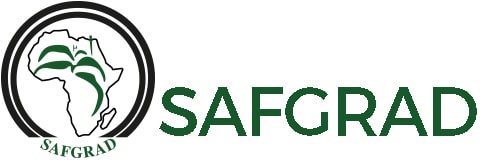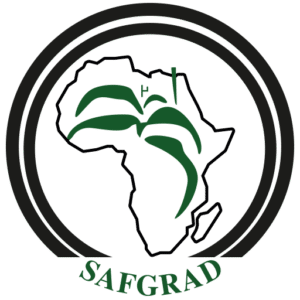African Union Semi-Arid Food Grain Research and Development (AU-SAFGRAD) and the Environment, Climate Change, Water and Land Management Division (ECCWLM) of the AUC with the support of partners are planning a High Level Policy Dialogue (HLPD) to take place in Ouagadougou, Burkina Faso from June 25-27, 2019 for the Sahel G5 countries.
1. Background and rationale
Environmental factors play a role in causing population movements, and conversely, migration has an impact on the environment.
For instance, internal migration, such as the process of urbanisation, is sometimes linked to environmental degradation and environmental disasters which force farmers and other rural populations off their land. Also, the presence of large numbers of displaced persons in refugee camps and Internally Displaced Persons (IDP) hosting areas can have negative effects on local environments. Environmental considerations should therefore be playing an increasingly important role in the formulation of policies on migration and forced displacement. In the discussions of the Rio+20 process, migration has been recognized for its increasing importance and relevance to the social, economic and environmental dimensions of sustainable development. Global inequality, the lack of decent work, poverty, conflict, gender inequalities and discrimination, terrorism and climatic pressure continue to drive people to search for ‘greener pastures’ including going abroad.
The relationship between Environment/Sustainable Agriculture and migration is complex with the other socio-economic factors that drive people to move, either voluntarily or by necessity. Some estimates indicate, however, that extreme events (floods, droughts etc.) and environmental degradation (desertification, soil erosion etc.,) which will be exacerbated by climate change – will move or permanently displace up to 200 million people by 2050.
Migration is therefore a nexus for many issues of sustainable development, such as agriculture, food security, water and energy. Globally, and in Africa in particular, the significant and multifaceted contribution that migration can make to development has gained greater recognition. With the adoption of the Sustainable Development Goals (SDGs) in 2015, and explicit references to migration in six of its 17 goals, migration has gained global prominence.
The African Union (AU) in 2015 launched Africa’s development strategy for the next half century, with the adoption of Agenda 2063, which aspires to an integrated and politically united Africa, and calls for the free movement of people, capital, goods and services. The African Union recognises the crucial role of migration and displaced persons in the socio economic development of the continent. Hence the decision of Heads of State and Governments in their January 2019 summit to declare this year of migration under the theme: The year of Refugees, Returnees and Internally Displaced Persons: Toward Durable Solutions to Forced Displacement in Africa. Back in 2006, the African Union Migration Policy Framework for Africa (MPFA) was adopted in Banjul as one of the few regional policy frameworks which refer to the relationship between migration and the environment, including rural–urban migration due to environmental degradation and disasters and the consequences of forced migration on the environment.
At the regional level, the West Africa region and specifically the Sahel has been facing the last ten years tremendous displacements of people both within country and across borders. The region is affected by recurring insecurity and instability. Over the past decades, several armed conflicts have taken place in the region (Burkina Faso, Mali, Niger, Chad etc.). The displacement of population is affecting both the environment and the livelihoods production systems.
It is against this background that African Union Semi-Arid Food Grain Research and Development (AU-SAFGRAD) and the Environment, Climate Change, Water and Land Management Division (ECCWLM) of the AUC with the support of partners are planning a High Level Policy Dialogue (HLPD) to take place in Ouagadougou, Burkina Faso from June 25-27, 2019 for the Sahel G5 countries.
2. Objectives of the Dialogue
The proposed high level policy dialogue aims to enable the Sahel G5 Member States to come up with common understanding that will facilitate them to harmonize regional strategy in order to facilitate the coherent management of migration in the region by focusing on specific topics with direct impact on Environment Protection, Sustainable livelihood production, Pastoralist promotion etc. More specifically, the objectives of the High level Policy Dialogue include among others:
To bring together respective relevant ministers in charge of Environment from the Sahel G5 countries and experts to exchange views, ideas and experiences on how to best respond to the realities of environmentally induced movements in their respective countries and to identify effective practices for minimizing vulnerability;
To provide the those countries with the opportunity to discuss different dimensions of capacity-building required to manage the multifaceted impact of climate change and environmental degradation on human mobility;
To exchange innovative ideas for multi-stakeholder partnerships at all stages of the migration process, including strategies for a comprehensive approach to ensure effective protection and assistance to environmental migrants,
To facilitate the Sahel countries develop harmonized sub regional policies and collective responses to manage migration,
To provide a better understanding of the nexus between environmental degradation, food insecurity and instability in the region,
To promote advocate for mainstreaming Environment related migration in national and regional frameworks.
3. Expected outcomes
The Panel Discussion on Migration and Sustainable Development:
Deepen the understanding on relations between migration and sustainable development, including trends, patterns, opportunities and emerging challenges;
Deliberate on root causes of migration as they relate to climate change and environmental degradation.
Promote effective national policies as well as international and regional cooperation and dialogues on migration and sustainable development and share successful experience and lessons learned; and
Promote collaboration and synergies between the ministries as well as the relevant stakeholders
Identify potential entry points on the global compact on migration
A ministerial declaration on the subject which would be taken to other the policy organs of the African Union.
4. Structure the of the dialogue
The deliberations and discussions during the High Level Dialogue will be structured as follow:
A two-day expert session to deliberate on thematic focus areas as well as around key issues such as the root causes of Environment displaced people; the policy pathways to ensure better management of environmental migrants. It would be interactive in nature and would permit robust engagement for the participants to share experiences.
One day Ministerial session where invited ministers from the five (05) countries would deliberate on the outcomes of the expert work which will ultimate produce a communique.
5. Participants
The High Level Policy Dialogue is aimed at Ministers in charge of Environment and senior officers of the relevant Ministries. It will also benefit from the insights and experience of representatives of the African Union Commission (AUC); Regional Economic Communities (RECs), the NEPAD Planning and Coordinating Agency (NPCA), UN agencies as well as a select number of representatives from Academic and research institutions, experts from diverse fields of competency., Private Sectors, Traditional leaders/mediators, and experts from diverse fields of competency.
6. Date and venue
The High Level Policy dialogue will be held in Ouagadougou, Burkina Faso from 25-27 June 2019.
7. Partners
AU-SAFGRAD will be partnering with ECCWLM division – AUC headquarters, the Government of Burkina Faso and, UNEP to organize this Policy Dialogue. AU-SAFGRAD and partners will be funding this event and will be in charge of the logistic arrangements.
8. Facilitation
Two (02) Expert consultants will be engaged to facilitate the dialogue supported by Experts from the organizing institutions.



